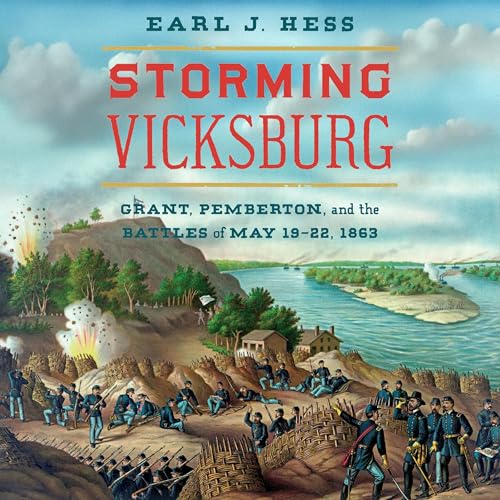
Storming Vicksburg
Grant, Pemberton, and the Battles of May 19-22, 1863 (Civil War America)
カートのアイテムが多すぎます
カートに追加できませんでした。
ウィッシュリストに追加できませんでした。
ほしい物リストの削除に失敗しました。
ポッドキャストのフォローに失敗しました
ポッドキャストのフォロー解除に失敗しました
聴き放題対象外タイトルです。Audibleプレミアムプラン登録で、非会員価格の30%OFFで購入できます。
¥3,100 で購入
-
ナレーター:
-
Mark Sando
-
著者:
-
Earl J. Hess
このコンテンツについて
The most overlooked phase of the Union campaign to capture Vicksburg, Mississippi, was the time period from May 18 to May 25, 1863, when Ulysses S. Grant closed in on the city and attempted to storm its defenses. Federal forces mounted a limited attack on May 19 and failed to break through Confederate lines. After two days of preparation, Grant’s forces mounted a much larger assault. Although the Army of the Tennessee had defeated Confederates under John C. Pemberton at Champion Hill on May 16 and Big Black River on May 17, the defenders yet again repelled Grant’s May 22 attack. The Gibraltar of the Confederacy would not fall until a six-week siege ended with Confederate surrender on July 4.
In Storming Vicksburg, military historian Earl J. Hess reveals how a combination of rugged terrain, poor coordination, and low battlefield morale among Union troops influenced the result of the largest attack mounted by Grant’s Army of the Tennessee. Using definitive research in unpublished personal accounts and other underutilized archives, Hess makes clear that events of May 19–22 were crucial to the Vicksburg campaign’s outcome and shed important light on Grant’s generalship, Confederate defensive strategy, and the experience of common soldiers as an influence on battlefield outcomes.
The book is published by The University of North Carolina Press. The audiobook is published by University Press Audiobooks.
©2020 Earl J. Hess (P)2025 Redwood Audiobooks批評家のレビュー
“A masterpiece from an exceptional historian.” (North Carolina Historical Review)
“There is much to admire. . . . All in all, this is a fine work.” (Emerging Civil War)
“Exceptional...Thoroughly researched and provides detailed and compelling accounts of the battles of May 19 and 22...” (Journal of Southern History)


